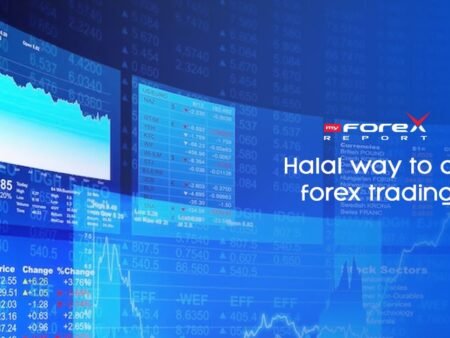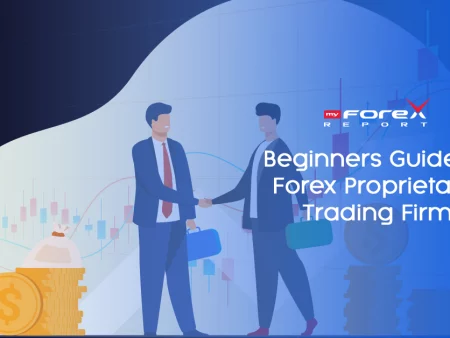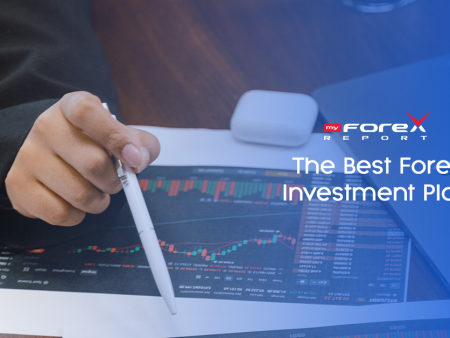Last Updated on August 31, 2022 by Richard Gibson
Once you’re in the forex trading market, you’ll get to see thousands of brokers offering you services to win your business. Finding a forex broker is simple; simply go to any financial website and look for a list of forex brokers. However, choosing the right one for you has never been easy. You need to think about a few factors before choosing a forex broker to trade with. We’ll go through the aspects you should think about before picking a forex broker in this article.
Every broker has a unique account offering, but there are a few key factors to consider before deciding on a service, such as leverage and margin, commission and spread, initial deposit requirements, and the convenience of deposits and withdrawals.
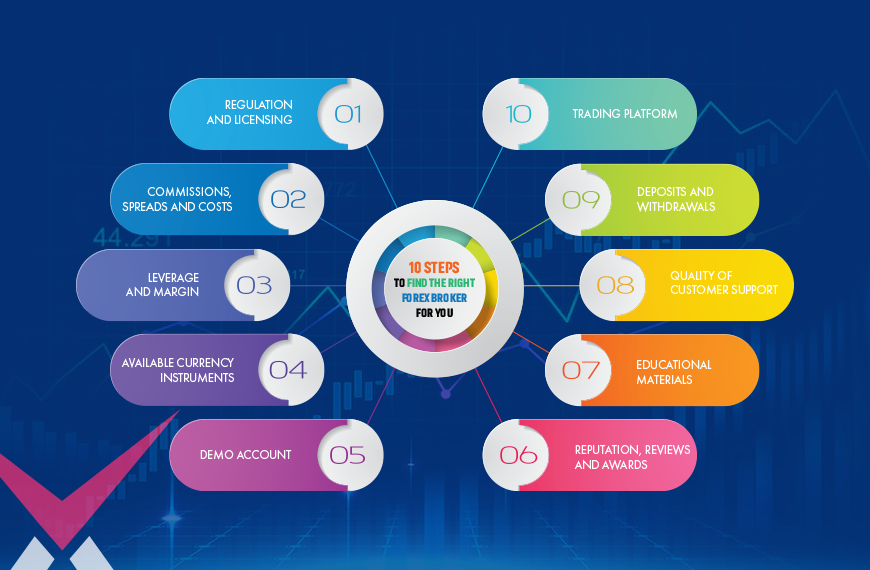
If you would like to learn more about this article, watch the video summary below:
Regulation and Licensing
Forex brokers are generally regulated by local or regional financial regulators around the world. Regulated and licensed by a local or international authority to ensure that brokers are transparent, honest, and accountable to the best interests of the traders. A fancy website is never sufficient proof of a forex broker’s legitimacy. The website should be informative, with the consent of which authority they are conducting their business clearly stated. For instance, in the United States, a credible forex broker must register with the National Futures Association (NFA), which serves as the trading industry’s self-regulatory authority. Additionally, it will be registered with the Commodity Futures Trading Commission (CFTC), which regulates the American trading markets. The “About Us” section of a broker’s website generally has a listing of their NFA member number.
However, every country outside the US does have its own regulatory system. Accounts should only be created with brokers that are properly regulated due to possible concerns about the safety of deposits and the broker’s credibility. ICMarkets and FPMarkets represent examples of regulated brokers.

Major Forex regulatory bodies:
| Country | Authority |
| United Kingdom | Financial Conduct Authority, (FCA) |
| Europe | The European Securities and Markets Authority (ESMA) |
| Australia | Australian Securities and Investments Commission (ASIC) |
| New Zealand | Financial Markets Authority (FMA) |
| Singapore | Monetary Authority of Singapore (MAS) |
| National Futures Association (NFA) | |
| Cyprus | Cyprus Securities Exchange Commission (CySEC) |
| South Africa | Financial Sector Conduct Authority (FSCA) |
| Switzerland | Switzerland Financial Market Supervisory Authority (FINMA) |
| Dubai | Dubai Financial Services Authority (DFSA) |
| Germany | The Federal Financial Supervisory Authority (BaFin) |
Commissions, Spreads and Costs
Some brokers in the market charge a specific percentage of the spread, a spread is a difference between the bidding price and the asking price of a forex pair. There are some brokers who don’t ask for the charge, but they make a profit by widening the spread.
The initial deposit varies depending on the broker. Forex accounts can be funded with an amount as low as $50. With this small investment, the leverage increases the buying power, and most traders and investors find forex attractive because of these advantages. Brokers offer different types of accounts based on how much money you put in at first. They have standard, mini, and micro-accounts.
Leverage and Margin
There are brokers who make leverage available to their margin accounts. Some traders offer as much as 200:1 leverage. Don’t you know how it works? No problem. Suppose a trader has $1000 in his account and a broker is offering 40:1 leverage. This would mean that a trader would get as much as $40,000 for every $1,000 invested. Leverage works to a trader’s benefit since it improves the likelihood of generating more money. Leverage has a downside. While it can increase a trader’s profit by a large amount, it can also quickly drain a trader’s account due to the high risk of losing money.
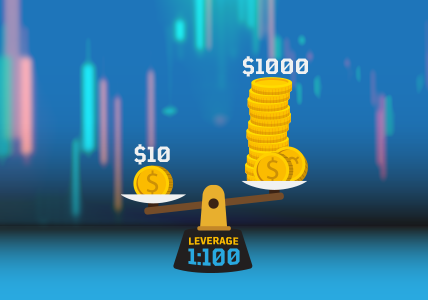
Available Currency Instruments
Brokers provide a wide range of currency pairings for trading, but not all of them are given the same attention. As a result, you should look for currency pairs with high liquidity. Identify the broker who offers those currency pairs. The most popular pairs include EUR/USD and GBP/USD pairs, the major pairs include USD/JPY and USD/CHF.
Remember, brokers may provide a large number of currency pairings, but the most important thing is that they provide you with the pairs that you are interested in.
Demo Account
Today, many forex brokers facilitate demo trading accounts, allowing traders to quickly connect to the real-time market using virtual money. This ultimately enables traders to determine whether the trading service that the broker has promised is up to standard or whether it meets their expectations. Some forex brokers do not offer free demo accounts; rather, a trader must sign up before using their demo trading services.
Before you start trading in the real trading market, we strongly recommend you test the free demo trading account. This would assist in determining what concerns you need to note down or work on in order to trade in the real market.
Trading Platform
For an investor or trader, a trading platform is not just a requirement, but also a must-have. Trading platforms serve as a portal for traders, allowing them to access technical and fundamental trade analysis supplied by the broker’s trading software. A trader or investor can quickly enter or exit a deal using a trading portal. A well-designed portal today contains “buy” and “sell” buttons, as well as a “panic” button that quickly closes any open deals. Trading platforms also offer the facilities of customization options, order entry types, automated trading options, strategy builders, backtesting features, and trading alerts. Many brokers offer demo accounts so that you can get used to the trading interface before you start trading for real money.
Deposits and Withdrawals
Every broker has its own withdrawal and financing policies, which differ from one another. Traders may usually fund their accounts online using a credit card, PayPal, or even a bank check or wire transfer. Withdrawals can be done by cheque or wire transfer, and the broker may charge a fee for this service.
Quality of Customer Support
A reputable and client-friendly broker must provide excellent customer service. Because the forex market is open 24 hours a day, you should look for brokers who provide dedicated customer service around the clock. A trader might seek support at any time, and they might need to find a solution fast. That’s why forex brokers who offer telephone and text customer support are considered as great trading partners by successful traders.

Multilingual support is currently a popular customer service feature. From the broker’s point of view, this draws in a large new trading community, and as a trader, you can expect to receive help that is easy to understand.
We encourage you to test a broker’s customer service efficiency very early in the trading process; you are also free to do so during the demo trading phase. This will enable you to assess a broker’s ability to provide support in live trading conditions without risking any of your own money.
Part of Education
Education is an indispensable part of any trader’s life, regardless of the industry. In forex, since the market is decentralised, it is crucial to be updated with the most recent trading techniques and trading secrets. The need for this education can be filled in different ways and a forex broker who considers the best interests of traders would certainly facilitate them with proper educational guidance.
Resources to look out for include:
- Educational Blog Posts
- Online courses & tutorials
- eBooks
- Webinars and videos
Reputation, Reviews and Awards
In any industry, the reputation of a brand or service is essential. The reputation of a forex broker is significant in the same way. If a broker or other forex service provider offers a high-quality service, traders’ perceptions of that brand or service will reflect that. A strong reputation, positive customer feedback, and industry-leading recognition from an independent organization like MyForexReport all contribute to the credibility of a certain broker or other forex service provider.
A forex broker’s reputation and reviews are comparable to the filling on a burger. They both are interrelated; a reputable forex broker will hardly have any negative reviews, and the same goes for positive trader feedback; reviews are what give a broker that reputation. Checking out reviews on websites like Trustpilot and SiteJabber, discussions on trading forums, news releases, and widely accessible financial information can all help you easily determine whether the broker you’ve picked is reputable and worthy of your expectations.

Conclusion
A trustable forex broker is a key to success for an investor or trader. If your forex broker is doing their work accurately you’ll get time to focus on other important things like developing strategies and managing your trading plans. Do research before choosing a forex broker because a good broker can take you miles with success.
Download Now: How to Choose a Forex Broker [Free eBook]
How To Choose a Forex Broker FAQs
Brokers in Forex are the ones who work as the middleman between you and the trading market to execute trades. Traders sign up to a broker to get access to selling and buying currency instruments in the real trading market. However, they also function as a middleman between you and a “liquidity provider” in addition to acting as a middleman between you and another buyer or seller.
In its true essence, the term “broker” may be used to refer to a person you called to buy or sell currencies. With the access of the internet and modern devices, now you can connect with a broker using a trading platform or trading software.
1. Review the steps listed below for choosing reliable a forex broker:
2. Regulation and licensing
3. Commissions, Spreads and Costs
4. Leverage and Margin
5. Available Currency Instruments
6. Demo Account
7. Trading Platform
8. Deposits and Withdrawals
9. Quality of Customer support
10. Part of Education
Regulated brokers have their regulatory information publicly on their websites. Most of the time, you will find the regulated info, license number, as well as the company name at the bottom of the homepage in the footer of the “about us” pages. If you cannot find this information, you should double-check the legality of the broker.
If your Forex broker is licensed by the regulator, you should find it in the search results. You can email the regulator directly or use the website to do so. Also, you can ask the Forex broker for further information about the business.
– Enter the broker’s website and review the account types of accounts available and ensure your eligibility. Complete the registration form on the broker’s official website with personal data: name, email, phone number, address and with a username and password that will give you access to your account.
– Sign In to your account by inserting your login and password.
– Once your account is opened, deposit the initial fund and start trading.

Richard Gibson is a trade analyst and writer for MyForexReport. He has over 10 years of experience in investing and trading equities, options and bonds. He trades options, stocks, and ETFs regularly following a value-driven investment philosophy. He’s a graduate of the University of MacEwan University, and holds a graduate certificate in financial planning from the University of Calgary.
Forum Profiles: Babypips
